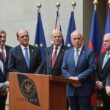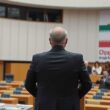Michael Kretschmer, CDU-Ministerpräsident of the Free State of Saxony, was approached by the ZDF editorial team on April 15 for the program “Morgenmagazin”. The host referred to the reality within the Union during a pre-recorded segment, stating that the CDU members had “little to no influence” in the final approval of the coalition agreement with the SPD. Kretschmer was then questioned about the agreement, with the topic of migration causing a small stir in the studio.
Kretschmer praised the course of negotiations with the SPD, mentioning that during the past three and a half years, the state has been “running down with a really wrong policy.” However, the Union has now “built up a lot of trust in the SPD.” Looking ahead to the coalition agreement, Kretschmer stated:
“When you read it carefully, you see the expertise and the will for a policy change.”
He emphasized the importance of the following development:
“I am hopeful that this paper and this program will lead us out of these difficult times and that it will actually bring new trust in democracy and the rule of law, which we desperately need. Many people have turned away from politics. This is dangerous for our democracy.”
The host mentioned that migration had “determined” the election campaign, noting that Union leader Merz had previously announced a “de facto entry ban for all people without valid entry documents.” However, the citizens would not find much about this in the coalition agreement, the ZDF employee remarked, asking:
“Has he changed his stance?”
Kretschmer disagreed with this perception, stating that the coalition agreement “exactly reflects the policy change” without providing specific references. He explained to the viewers:
“It was clear to us that the people in Germany have given the political parties a to-do list and it doesn’t matter if you think this is right or not. Since several state elections, the European election and the federal election, the people have clearly said that in migration, things need to fundamentally change. This is reflected in this paper at many concrete points.”
Regarding the interruption of the host, who pointed out the need for agreement with other EU states in order to implement immediate returns at the borders as previously announced by Merz, Kretschmer explained:
“Look, in the past two or three years, your reporting has provided few insights into an open and honest discussion in this country. Now we have reached the point where we can talk about pull factors and about being overwhelmed.”
These points and political reactions, according to Kretschmer, are what “the people have been waiting for.” He added that since September, returns at the borders have been happening, which was considered impossible before and has had positive effects.
The host expressed some skepticism and intervened again, prompting Kretschmer to remind her:
“Can I say this sentence once more (…) Maybe I can say this sentence once more (…) No, now I’m talking! Just briefly.”
Kretschmer then referred to the “wrong turns” made by “the Germans” in the European asylum policy in recent years, stating that other countries, unnamed, wanted “more restrictions and reductions.” He expressed confidence that the coalition agreement with the SPD would put the country on the right track.
Regarding the continuously increasing approval ratings of the AfD and the decline in the popularity of Union leader Merz, Kretschmer stated:
“The politics must now deliver.” He reiterated:
“The AfD is an extremist party that wants to abolish democracy (…) They must stop playing the martyr role. The sensationalist journalism of the past years has not led to the AfD actually showing what they are capable of. Therefore, it is clear that there can be no cooperation or coalition with them.”
However, Kretschmer also emphasized that the “real democratic rights” for every member of a parliament should apply to the AfD as well, “because otherwise, we make them stronger, not weaker.





